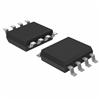DescriptionThe MAX7327 uses two address inputs with four-level logic to allow 16 I2C slave addresses. The slave address also determines the power-up logic state for the I/O ports, and enables or disables internal 40k pullups in groups of two ports. The interrupt is latched, detecting transient changes. When the MAX7327 is subsequently accessed through the serial interface, any pending interrupt is cleared. The 12 push-pull and the four open-drain outputs are rated to sink 20mA, and are capable of driving LEDs. The RST input clears the serial interface, terminating any I2C communication to or from the MAX7327. The MAX7327 is one device in a family of pin-compatible port expanders with a choice of input ports, open-drain I/O ports, and push-pull output ports (see Table 1). The MAX7327 is available in the 24-pin QSOP and TQFN packages, and is specified over the -40°C to +125°C automotive temperature range. The MAX7327, a 2-wire serial-interfaced peripheral, features 12 push-pull outputs and four configurable open-drain I/O ports with selectable internal pullups and transition detection. Ports are overvoltage protected to +6V, independent of supply voltage. The four I/O ports configured as inputs are continuously monitored for state changes (transition detection). State changes are indicated by the open-drain, +6V-tolerant INT output.
The features of MAX7327 can be summarized as (1)400kHz I2C serial interface; (2)+1.71V to +5.5V operating voltage; (3)12 push-pull output ports, rated at 20mA sink current; (4)4 open-drain I/O ports, rated at 20mA sink current; (5)I/O ports are overvoltage protected to +6V; (6)selectable I/O Port Power-Up Default Logic States; (7)transient changes are latched, allowing detection between read operations; (8)INT output alerts changes on inputs; (9)AD0 and AD2 inputs select from 16 slave addresses; (10)low 0.6A (typ)standby current; (11)-40°C to +125°C temperature range.
The absolute maximum ratings of MAX7327 are (1)(all voltages referenced to GND.)supply voltage: V+-0.3V to +6V; (2)SCL, SDA, AD0, AD2, RST, INT, P2P5: -0.3V to +6V; (3)O0, O1, O6O15: -0.3V to V+ + 0.3V; (4)O0, O1, O6O15 output current: ±25mA; (5)P2P5 sink current: 25mA; (6)SDA sink current: 10mA; (7)INT sink current: 10mA; (8)total V+ current: 50mA; (9)total GND current: 100mA; (10)continuous power dissipation (TA = +70°C)24-Pin QSOP (derate 9.5mW/°C over +70°C).761.9mW/ 24-Pin TQFN (derate 20.8mW/°C over +70°C): 1666.7mW; (11)operating temperature range: -40°C to +125°C; (12)junction temperature: +150°C; (13)storage temperature range: -65°C to +150°C; (14)lead temperature (soldering, 10s): +300°C.

 MAX7327 Data Sheet
MAX7327 Data Sheet






